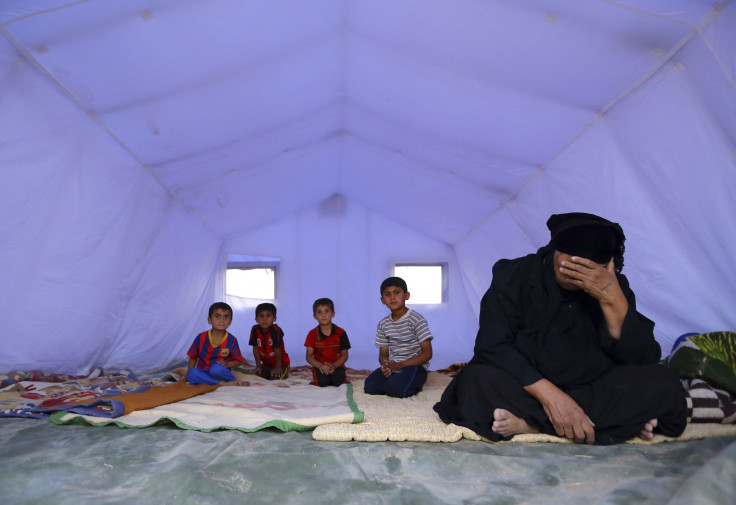Iraq ISIS Incursion Presents Dilemma For Sunni Muslims

For Iraqis of the Sunni Muslim faith, the conflagration now spreading across the country at once presents a dire threat to safety and a tenuous opportunity.
The threat comes via the Islamic State of Iraq and Syria, the jihadist Sunni sect that has seized major pieces of Iraqi territory -- not least Mosul, the second-largest city. With good reason, ISIS has gained a reputation for extremism, employing a medieval approach to rule that includes public beheadings and crucifixions.
Yet ISIS has also gained adherents by portraying itself as a defender of Sunni Arabs. (Most Kurds are also Sunnis, but live in their own autonomous region.) That makes an effective pitch in key parts of Iraq, including in Mosul, where the Sunni population has suffered oppression and neglect under the Shiite-dominated government that has ruled in Baghdad since the U.S. occupation authorities handed over control.
As ISIS seeks to capture greater slices of territory, pressing its offensive south to Baghdad, a key question is which of these conceptions will gain currency among the country's Sunnis: Will they accept or even embrace ISIS as the antidote to a hostile Shiite regime or instead fear the arrival of fresh enemies who govern in the name of Shariah law?
The answer to that question may shape what plays out in Iraq in the coming days, influencing whether the government will be able to mount an effective counter-offensive that keeps Iraq whole, or whether the country is destined to splintered into pieces defined by ethnic, religious and tribal loyalties.
Some of the estimated 500,000 civilians who fled Mosul have been telling journalists they fear more a large-scale offensive by the Iraqi military against ISIS fighters than of ISIS itself. Others reacted to rumors that the American military would get involved and bomb the city. Neither of these scenarios has yet materialized.
Ahmed Hussain, a police officer in Mosul who abandoned his post after seeing the army flee ahead of ISIS fighters, is not among the returning residents of Mosul, but neither is he a fan of the government.
“Maliki wants to end the Sunnis,” Hussain told the New York Times, referring to Iraq’s Shiite prime minister, Nouri al-Maliki. “Can you tell me how many Shiites are arrested on terror charges? Almost all those in prison are Sunnis. He is targeting us. I want to go back to Mosul, but we are afraid we’ll see another Fallujah.”
Last month, the Iraqi army attacked Fallujah with “barrel bombs,” killing hundreds of people, in response to a five-month-old Sunni uprising in the city -- which was the scene of bloody battles during the American occupation.
Some Sunni Iraqis see opportunity in the ISIS insurgency. The group’s social welfare programs, known as dawa, include organizing recreational activities for children, distributing food and fuel to the needy and establishing medical clinics -- all contingent upon citizens’ following a strict Shariah code.
In Syria, ISIS gained ground by aligning itself with other rebel groups and exploiting the security gaps left by the country’s civil war. But the group’s brutal rule ended up alienating other rebel groups, including even al Qaeda. In Iraq, ISIS draws support from local groups that are angry with the Iraqi government and police. The primary reason is that Iraq’s Sunni minority lost power after the 2003 U.S.-led invasion that toppled Saddam Hussein. Since the U.S. withdrew its forces in 2011, the Sunni population has felt alienated by Maliki's Shiiite-dominated government and his U.S.-trained military.
ISIS has exploited the situation and drawn public support to strengthen its hold as it advances across the country, which has cast the Iraqi army -- already in a precarious situation -- in the role of an occupying force in Sunni territory.
Iraqis who who have returned to Mosul contend that ISIS fighters there are keeping a low profile, aside from a small number of men in black masks monitoring checkpoints. One woman claimed in an interview with the New York Times that the militants aren’t harming anyone. “On the contrary, they are welcoming the people,” she said.
Other residents said they could move about the city more freely than before because militants cleared roads that the army had blocked years ago in the name of security.
“So far, the militants have not harmed any civilians, and they have freed the city from the checkpoints that choke us,” Ammar Saleh, 32, who works in a hospital in Mosul, told the Times.
But others cite reports of mass killings, and worry that even the current relative stability may be short-lived.
An ISIS leaflet circulated Thursday shows new rules for Mosul residents that include mandatory prayer at the mosque five times a day and prohibitions against public gatherings and drugs, alcohol and cigarettes. Women must dress conservatively and stay indoors unless they must go outside of necessity. Anyone who violates the rules face harsh retribution, including amputations of hands, and anyone found working for the government faces the death penalty unless absolved through unspecified “repentance.”
The U.N. human rights chief Navi Pillay warned of "murder of all kinds" and said such killings have already begun. On Friday Pillay reported that her office had received reports that militants had rounded up and killed an unspecified number of Iraqi army soldiers and 17 civilians in a single street in Mosul.
© Copyright IBTimes 2024. All rights reserved.












